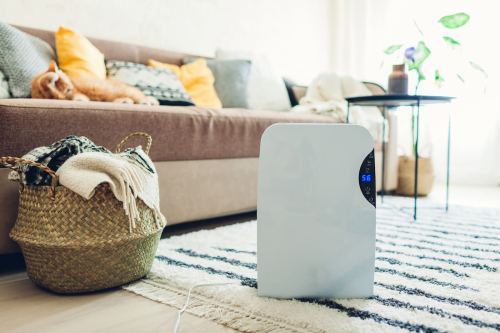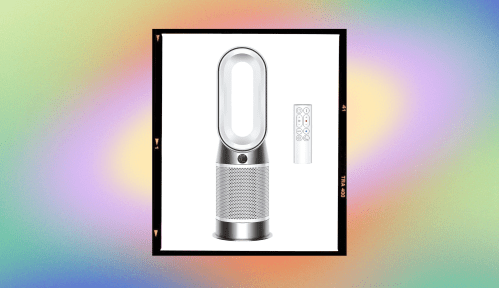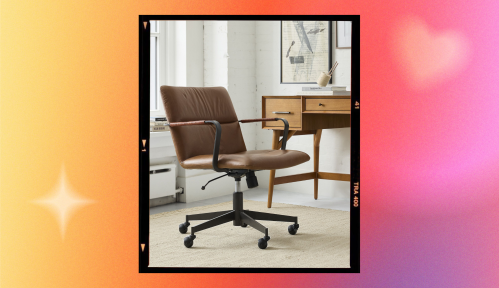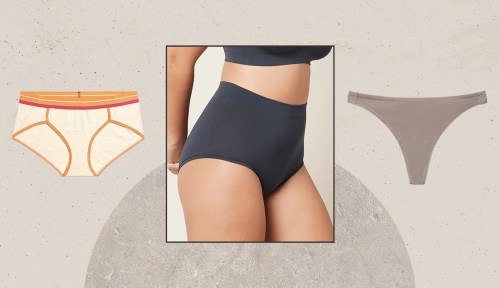Our editors independently select these products. Making a purchase through our links may earn Well+Good a commission
What’s the Difference Between a Humidifier, a Dehumidifier, and an Air Purifier?
Do I need a dehumidifier, humidifier, or an air purifier? Here's the difference between the two and the signs to look for if you need one.

If your indoor air quality is bad, you tend to know it. When deciding between a humidifier, dehumidifier, or an air purifier, there are a few things to consider. And unless you’re able to pinpoint the issue in your home, it can be hard to know which one you need. John McKeon, MD, CEO of Allergy Standards, explains that figuring it out can be tricky.
“You have to be a bit of a detective and look at all the parameters because there are lots of things that contribute to healthy indoor air,” says Dr. McKeon. “When you’re looking at, avoiding trigger factors. Overall in your home, we say look at the cleaning products, look at the bedding you’re using, the textiles, what type of vacuum cleaner you have. You might be coughing because you need to allergy-proof your bed. But, anything from the environment you live in, to your air conditioner could be making your air dry.
Once you rule out easy-to-remove alleges, it’s time to consider the air quality and humidity levels in your home.
Dehumidifier versus humidifier
All humidifiers and dehumidifiers do is change the relative humidity of your air. Unless otherwise stated, they don’t cool or clean your air.
When it comes to humidity, the EPA recommends keeping your indoor relative humidity between 30 and 50 percent. To measure your relative humidity, you can tap a pro, or try this Govee Bluetooth Digital Hygrometer ($12). Another (less precise but helpful) way to test your humidity levels is the ice cube test. According to Innovative Dehumidifiers, all you need is a glass, water and ice cubes. In a room that isn’t your kitchen or bathroom (humidity levels in these spaces can be higher from cooking, showers, etc.) place two or three ice cubes into a glass, add water, and stir. Wait three to four minutes and if moisture does not form on the outside of the glass, the air is too dry. If water has condensed on the outside of glass the air is too humid.
Dr. McKeon says if you live in a humid environment or in an especially humid home, you need a humidifier to dry out the air. “[When] there’s too much moisture in the air, that can actually cause build-up of more bioburden and allergens in the indoor environment.” He says it can also lead to mold.
For a dehumidifier, consider the Toshiba Portable Air Conditioner With Dehumidifier. It’s a dehumidifier and an air conditioner combo to keep your air cool and dry. Get the 8,000 BTU model ($329) or the 10,000 BTU model ($379).
Shop: Toshiba Portable Air Conditioner With Dehumidifier, $379
When your air is too dry, Dr. McKeon says it “irritates your mucous membranes so your eyes and your nose, and can cause issues with breathing and be part of causing asthma and allergic reactions.”
For a humidifier, consider the Dyson Pure Humidify + Cool ($800). It takes everything you love about Dyson’s top-line air purification technology and adds a humidifier.
Shop: Dyson Pure Humidify + Cool, $800
For both humidifiers and dehumidifiers, Dr. McKeon says you want to keep the water reservoirs clean. When neglected, they can be breeding grounds for mold and bacteria.
Air purifier
Air purifiers work to filter out allergens and particulates in your air
“Indoor air quality can be two to five times more polluted than outdoor air quality,” says Dr. McKeon. “It would be wrong to spread a message that everybody needs to have an air purifier. Many people benefit by having a device to clean the air, but people may live in an indoor environment that’s got good air quality already and it’s well ventilated.”
From allergens like pollen and animal hair to the particles released whenever you light a candle or cook, lots of issues can lead to poor indoor air. When shopping for an air purifier, Dr. McKeon says it’s important to ensure it’s validated by a third part organization. Consider the Coway Airmega 200M ($207). This Energy Star certified air purifier is perfect for small living spaces and bedrooms, as it’s able to reduce contaminants in rooms up to 361 square feet.
Shop: Coway Airmega 200M, $230
Sign up for the Well+Good SHOP Newsletter
Get exclusive deals on wellness, beauty, fitness, and food products that have been hand-picked by our editors.
Got it, you've been added to our email list.









